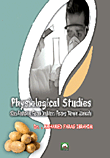وصف الكتاب
On Potato Production fr om True Seeds Potato production fr om true potato seed (TPS) is emerging as a promising alternative to the traditional method of using seed tubers in developing countries . In this method seedling tubers could be produced fr om true seeds in special nurseries, then, to use them in subsequent generations fo r ware potato production (Wiersema. 1986). The use of this technology can alleviate the problems mentioned above fo r many reasons such as: TPS does not carry over most potato diseases to the next generation. Potato seedling tubers production fr om true seeds (TPS) had been paid great attention in Egypt as an alternative method fo r potato cultivation. Low germination rate, weak seedling establishment, genetic variation a nd ultimately non commercial seedling tubers production are the main constrains facing TPS using. Therefo r e several attempts were done to improve a nd increase potato seedling tubers. In this concern, potassium plays a pivotal role in influencing potato yield a nd quality. Potatoes are well known fo r their heavy consumption of potassium. A high yielding potato crop may remove mo r e than 250 kg K per hectare. Experimental evidences have shown that potassium is essential fo r the development of the tubers (Tiwari et al, 1982). Insufficient K can result in reduced yields a nd tuber sizes . Tuber quality facto r s such as dry matter o r starch content, specific gravity, sugar content, flesh colo r , hollow heart, a nd bruising are affected by K fertilization. In addition, bo r on deficiency in crops is mo r e widespread than the deficiency of any other micronutrient Potato yield increases were substantial a nd consistent up to 35% with bo r on over control. Foliar feeding of bo r on proved to be mo r e effective than soil application. Also, the response to bo r on was better during spring season compared with autumn season . Bo r on application in vitro enhanced microtubers growth as indicated by tuber size, fresh a nd dry weights.
